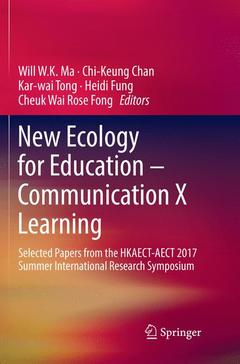Description
New Ecology for Education — Communication X Learning, Softcover reprint of the original 1st ed. 2017
Selected Papers from the HKAECT-AECT 2017 Summer International Research Symposium
Coordinators: Ma Will W.K., Chan Chi-Keung, Tong Kar-wai, Fung Heidi, Fong Cheuk Wai Rose
Language: English
Subject for New Ecology for Education — Communication X Learning:
Publication date: 12-2018
Support: Print on demand
Publication date: 05-2017
Support: Print on demand
Description
/li>Contents
/li>Biography
/li>Comment
/li>
This book gathers the best papers from the HKAECT-AECT 2017 Summer International Research Symposium. Revealing the complex interactions between communication and learning, which are represented by the symbol ?X? in the title, it provides a platform for knowledge exchange on the new ecology for education in the digital era. It also equips readers to handle complex issues in both communication and education, and clarifies the difference between practitioners and academics in communication and in education.
Ma, Wai-Kit Will received his PhD at the University of Hong Kong. He is currently an Associate Professor at the Department of Journalism and Communication, Hong Kong Shue Yan University. Dr. Ma’s research focuses on the use of information systems for communication, knowledge sharing and knowledge creation. He is the President of the HKAECT and served as Co-editor of the Journal of Communication and Education.
CHAN, Chi-Keung (Alex) earned his master and doctoral degrees in Educational Psychology at the University of Minnesota – Twin Cities. Alex is currently an Assistant Professor at the Department of Counselling and Psychology, Hong Kong Shue Yan University. He is also the Vice-President of the HKAECT. His research interests include cyber risky behaviors and positive technology.
TONG, Kar-wai is the Secretary of the HKAECT. Dr. Tong holds a degree of Doctor of Juridical Science and serves as an editor for various international journals. He is also a book co-editor. His research interests include happiness, Confucianism, human rights, medico-legal liabilities, and legal issues in education.
FUNG, Heidi is the Treasurer of the HKAECT and an Assistant Professor at the Department of Accounting, Hong Kong Shue Yan University. Heidi received her MSc (ITE) at the University of Hong Kong and her MBA at the University of Melbourne, Australia. Her research interests include educational technology, blended learning in higher education, and generic skills development.
FONG, Cheuk Wai Rose earned her doctoral degree in Education at Durham University, UK. She is currently a senior lecturer and the Director of Student Services at the Community College of City University (CCCU) and the Public Relations Officer of the HKAECT. Rose’s research interests include education technology, human-computer interaction, and thinking skills in self-reflection and creativity.
Equips readers to handle complex issues in both communication and education
Clarifies the difference between practitioners and academics in communication and in education
Calls for new communication and pedagogies in response to technological changes
Includes supplementary material: sn.pub/extras




